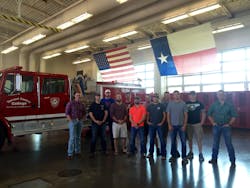Texas College Provides Military Veterans with Accelerated Fire Technology Degree
A group of military veterans meet two days a week at a Texas college to learn about firefighting, pursue an education, find a career and talk about their time during active duty. Tarrant County College offers the unique “College Credit for Heroes,” an accelerated one-year program that provides veterans with a 60-credit Associate of Applied Science degree in Fire Protection Technology.
“We owe our troops a lot and being able to do something to help them get a job that’s really a career is what it’s really all about,” says Rick Frye, assistant professor and program coordinator for Tarrant County College’s Fire Technology program.
The school received a grant to help military veterans and started the first fire technology class in 2013. About a dozen veterans are enrolled in the current program, which has also offered veteran’s degrees in law enforcement and environmental health and safety.
“It’s an accelerated program, so it’s tough,” Frye said. “It’s not a piece of cake and they have all worked really hard.”
When the program was first started, the question was how to get these veterans through so that they would be employable. “They want a job at the end of the deal,” Frye said.
The veterans also go through the Texas-certified fire academy at the college’s Northwest Campus and complete EMT training.
At that point, Frye says, “They have a ticket to the dance as far as applying for the fire department.”
The Brotherhood is the same
Brian Petit spent more than four years in the Marine Corp working with aviation ordinances before he moved with a group of friends to Texas. He was already enrolled in college for a degree in emergency management when he learned about the accelerated program.
“I’m all about not wasting any time and getting to the end,” Petit said. The training is very similar to what he learned in the Marines, including leadership skills to advance through the ranks.
“The brotherhood is the same and that’s one of the things that made this program easier for me,” Petit said. “I was never really big on college, but since I’m doing it with people who have been through the same thing it makes it’s easier for us to push each other to work through it.”
Brandon Harer found an interest in the fire service at a young age and joined the Orange County, CA, Fire Explorers. After joining the U.S. Marines, he continued as a reserve firefighter in at the Julian Cuyamaca Fire Protection District in San Diego County.
He relocated to Texas after learning about the College Credit for Heroes and works as a full-time EMT while attending college. The training, which also provides IFSAC certifications, opens the doors to explore Department of Defense fire department hiring.
Harer said his earlier years as a student were a challenge because he was not interested in the material he was learning and feels that his time in the Marines has helped him focus on the need for education. And his instructors have worked with him as he completes his degree.
“It’s a much more transparent transition,” Harer says of the program. “It’s the same type of chain of command…and instead of going on a worldwide scale of protecting life and property, you're now doing it locally. The sense of fulfillment I have gotten from both of these jobs is something I have latched on to.”
So far, two firefighters have been hired through the program.
Success stories
Aaron Warbritton has been with the Irving, Texas, Fire Department for three months. He heard about the college program from his friend, Joshua Kneisel, who learned about it from another friend.
“That was right up there with the day I signed up for the Marine Corps…it’s one the most important days of my life,” Warbritton recalled. “It sounded like a great opportunity and being a firefighter is something we always wanted to do. We were just working jobs after we got off active duty and going nowhere. It was such a time constraint that we had no time to test or take our EMT class.”
Warbritton has had a very busy three months, including a few multiple-alarm fires that have tested his new skills.
As a sergeant in the Marines he was used to giving orders to his team. He called the transition from being a leader to a follower a “mental hurdle.”
“Once you realize ‘I am new to this new organization, but I still have something to give it,’ it is at that point you can really start your career,” Warbritton said.
On Monday, Kneisel had his first day on the job as a firefighter in Weatherford, Texas. When he returned from his time as an artillery electronics maintenance engineer in the Marine Corps, he took a job “that was just a job.” He was at a birthday party when he saw a friend who was enrolled in the College Credits for Heroes and told him about the program.
“I called Aaron and said ‘How much do you hate your job? Do you want to be a firefighter?’” The next day we drove to the college and signed up for the accelerated program.
“One of the challenges was everybody having to check their attitudes at the door,” Kneisel said. “You’ve got to go back to being the new guy—you don’t want to downplay what you’ve done, but you can’t live on that. It’s a great program. They work with you and…you’re more than just another student to the instructors in this program.
About the Author
Peter Matthews
Editor-in-Chief/Conference Director
Peter Matthews is the conference director and editor-in-chief of Firehouse. He has worked at Firehouse since 1999, serving in various roles on both Firehouse Magazine and Firehouse.com staffs. He completed an internship with the Rochester, NY, Fire Department and served with fire departments in Rush, NY, and Laurel, MD, and was a lieutenant with the Glenwood Fire Company in Glenwood Landing, NY. Matthews served as photographer for the St. Paul, MN, Fire Department and currently is a photographer for the Fort Worth, TX, Fire Department.

